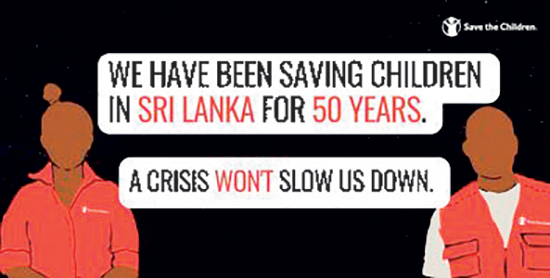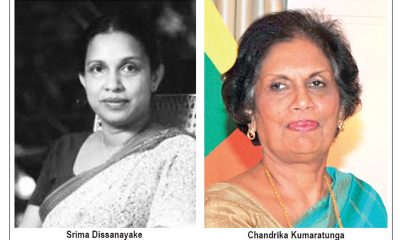News
Sri Lanka: One in three families see changes in children’s mental health amid economic crisis

COLOMBO, 28 July 2022 – Nearly one in three parents responding to Save the Children’s survey in June 2022, have noticed negative changes in their children’s behaviour in the last 6 months.
Since the beginning of the economic crisis, children have showed signs of distress and withdrawal. The survey of more than 2,300 families across nine districts in Sri Lanka also found nearly three out of four households had to spend more time with their children to accommodate their emotional and mental health needs.
Soaring inflation, daily power cuts, and shortages of fuel, food and medicines have stretched families beyond their ability to cope. The economic stress on families has triggered one in 10 children to experience changes in their appetite and show more signs of aggression. Save the Children’s survey also found that one in five children experienced changes in their sleep patterns, had difficulty regulating their emotions, showed violence towards others, or wet their beds.
Lakmi*, is a 10 year old girl from Ratnapura, Sri Lanka. She can’t go to school on days buses aren’t available, and talks about witnessing long fuel queues in her town.
“The situation in the country makes me very sad. I am afraid that we won’t have a country at the end of all this. There are problems with fuel, and the prices of food have also increased,” said Lakmi. “If I had the chance to do something for my country, I would work for the betterment of the people.”
Thisal* is a 13 year old boy from Badulla and he shared: “I don’t have a way to continue my learning properly because schools are often closed. I am scared that if exams are held, I might get low marks.”
Nadeesha*, 37, a mother from Badulla, explained that the financial pressure this crisis is having on her as a parent is having an influence on her children’s mental wellbeing:
“I have observed many big changes in my children’s behaviour. They are sad about the situation, but they try not to show it. They tend to worry because I am unable to provide them with what they like, the way I used to do. They worry that their parents don’t have a steady income to support the family. They are not happy like before. They don’t go out much to play. They are worried about what’s going to happen tomorrow.”
According to the UN’s Sri Lanka Humanitarian Needs and Priorities Plan, although Sri Lanka’s economic crisis is leading to a significant rise in mental health issues, the country cannot provide adequate Mental Health and Psychosocial Support (MHPSS) for those who need it due to the lack of financial resources. Without appropriate MHPSS, the mental health impact of the crisis on children can worsen, leading to poorer chances of long-term wellbeing and resilience.
Save the Children’s National Director in Sri Lanka, Julian Chellappah, said:
“In difficult and unsettling situations, children may externalise their feelings by showing signs of distress, with more crying and screaming among young children, more aggressive behaviour or violence, as well as difficulties in emotional regulation. Some will internalise their feelings, resulting in withdrawal. This is what we’re seeing unfold in Sri Lanka.
“Children often find it hard to make sense of crisis and often need support from family and friends to help them understand and cope with the resulting adversities. If children do not get the support they need, their symptoms can worsen.
“The constant worry over accessing food, clean water, medicines and even education is taking an immense toll on Sri Lankan children. We are calling on the government to find a sustainable economic solution to this crisis, to get families back on their feet and ensure children’s long-term mental health needs are prioritised and adequately funded.”
Save the Children in Sri Lanka is releasing its first Rapid Needs Assessment report, aimed to understand how communities are impacted by the ongoing crisis. The organization is responding to the needs of vulnerable families with plans to provide cash and livelihood support for nearly 1 million people. Save the Children’s humanitarian response strategy will also prioritize Mental Health and Psychosocial Support (MHPSS) by raising community awareness and empowering communities, both adults and children, to support each other’s psychosocial wellbeing in these tremendously distressing times.
The survey data was collected from May to June 2022 from a total of 2,309 households across nine districts in Sri Lanka. Every household had children. The minimum sample size of 245 households in each province provides a 90% confidence interval and a 5% margin of error for the target population.
Aspects of mental health and psychosocial well-being in children and adults were measured through self-assessment and observational rating scales, covering a number of positive and negative feelings as well as changes in children’s behaviour.
12.7% of families noticed changes in their children’s appetite
21.5% of families noticed their children either experienced changes in emotional regulation, changes in sleep patterns, unusual crying and screaming, showing violence towards others, or wetting their beds.
News
Noritake Company Limited donates Rs. 20 million to the Government’s disaster relief programme

Noritake Company Limited of Japan has donated Rs. 20 million to the Government’s disaster relief programme.
The cheque was presented to Prime Minister Dr. Harini Amarasuriya by the Managing Director of Noritake Lanka Porcelain (Pvt) Ltd, Mr. Kenji Obara, at the Parliament Complex on 18 December.
Minister of Public Administration, Provincial Councils and Local Government Chandana Abeyratne, Director and General Manager of Noritake Lanka Porcelain (Pvt) Ltd, Ms. Sujatha Egodagedara, and Assistant General Manager Captain M. M. Athula Rohan Senarath also participated in the event.
[Prime Minister’s Media Division].
Latest News
GovPay Concludes 2025 with Rs. 2 Billion in digital transactions, marking a major milestone in Sri Lanka’s digital transformation

GovPay, Sri Lanka’s Government Digital Payment Platform concluded the year 2025 by surpassing Rs. 2 billion in total digital transaction value, marking a major milestone in the country’s digital transformation journey. Notably, GovPay doubled its collections from Rs. 1 billion to Rs. 2 billion in just 45 days, reflecting rapid adoption, growing public trust, and strong institutional uptake across the public sector.
Since its official launch on 07 February 2025, GovPay has processed over 69,000 digital transactions, enabling payments for 3,372 government services across 215 government institutions. This accelerated growth underscores the increasing reliance on secure, convenient, and transparent digital payment mechanisms by both citizens and government institutions.
Implemented under the strategic leadership of the Ministry of Digital Economy, the Information Communication Technology Agency of Sri Lanka (ICTA) in collaboration with LankaPay, GovPay has emerged as a key pillar of Sri Lanka’s national digital public infrastructure. The platform plays a critical role in advancing financial inclusion, improving service efficiency, and strengthening transparency in public service delivery.
A key milestone in 2025 was the launch of the Online Traffic Fine Payment System through GovPay on 10 April 2025. Since its introduction, the system has facilitated over 50,000 digital traffic fine payments, generating more than Rs. 66 million in revenue. The service is currently operational across the Western, Southern, Northern, North Western, and North Central Provinces, including the Southern, Katunayake, and Central Expressways. While the island wide rollout planned for December 2025 was postponed due to adverse weather conditions and disaster-related challenges, ICTA, in coordination with the Sri Lanka Police and with the support of LankaPay, has agreed to complete the nationwide rollout in January 2026, with a landmark launch in the Central Province.
GovPay has continued to expand its reach across local authorities, including Divisional Secretariats, Municipal Councils, Urban Councils, and Pradeshiya Sabhas, significantly enhancing access to government services in citizens’ day-to-day activities. The platform has enabled digital transactions for all local authorities in the Northern Province and all Divisional Secretariats in the Southern Province, with a national target to digitize all local authorities by 2026.
Institutions such as Kotelawala Defence University, Sri Lanka Police, the Department of Technical Education and Training, the University of Moratuwa, and the Sri Lanka Atomic Energy Board emerged as some of the highest contributors to GovPay in 2025. Strong adoption by the education sector in particular highlights the readiness of younger generations to embrace digital transformation and demonstrates the platform’s scalability and reliability.
Beyond routine government services, GovPay also supported national disaster response efforts. Since 30 November 2025, the platform facilitated digital donations to the Rebuild Sri Lanka Disaster Relief Fund, collecting almost Rs. 14 million across 909 transactions, including contributions from Sri Lankans living abroad, ensuring transparency and ease of contribution during a national emergency.
As GovPay continues to grow, ICTA is working on revamping www.govpay.lk with enhanced features to support institutional onboarding, service management, and reporting capabilities. With Rs. 2 billion in digital collections achieved within its first year of operation and the last Rs. 1 billion reached in just 45 days, GovPay stands as a strong testament to the impact of coordinated digital transformation, reinforcing Sri Lanka’s vision of achieving a USD 15 billion digital economy by 2030.
News
Swift restoration of Religious, Cultural and Archaeological sites damaged by the disaster

A discussion on the restoration of religious, cultural and archaeological sites affected by Cyclone Ditwah was held on Thursday (18) afternoon at the Presidential Secretariat under the patronage of the Minister of Buddhasasana, Religious and Cultural Affairs, Dr. Hiniduma Sunil Senevi, with the participation of the Most Venerable Mahanayaka Theras of the three Chapters and other religious leaders.
Addressing the meeting, the Minister stated that more than one thousand religious, cultural and archaeological sites across the country had sustained damage due to the disaster. He assured that prompt measures would be taken to commence restoration work and reinstate these sites to their original condition without delay.
The Minister further stated that all restoration work is expected to be carried out while preserving the historical and cultural authenticity of the sites, under the guidance of the Most Venerable Maha Sangha and other religious leaders, with the active participation of all relevant stakeholders.
The Secretary to the Ministry of Buddhasasana, Religious and Cultural Affairs, Prince Senadheera, noted that arrangements are currently underway to mobilize the required human resources and financial assistance for the restoration process. He also stated that steps have been initiated to recruit the necessary technical officers on a contractual basis to conduct technical assessments of the affected sites. In addition, plans are in place to involve officials of the Ministry as well as officers of its affiliated institutions in carrying out these restoration activities.
The Secretary to the Ministry further stated that generous financial contributions from donors are currently being received to the fund established under the Ministry of Buddhasasana, Religious and Cultural Affairs for the reconstruction of damaged religious places of worship.
The meeting also considered continuing the gathering as an interfaith committee to oversee the restoration activities. Accordingly, it was agreed that the progress of construction work would be regularly reported to the committee and that the committee would be entrusted with mobilizing support for the fund in a transparent manner, including assistance from foreign donors, international organizations, Buddhist organizations and other religious institutions.
It was noted that the Central Cultural Fund has identified eight sites that were severely damaged by the disaster and are difficult to restore through conventional construction methods, requiring the specialized expertise of archaeologists, mural conservation specialists, and architects. The cost of restoring these sites has been estimated at over Rs. 500 million.
It was further decided that the committee would meet once a month to review and discuss the progress of these restoration activities.
Religious leaders commended the Government’s intervention in providing relief to those affected by the disaster and in restoring livelihoods, expressing appreciation for the effective management of the response. They also praised the Government’s prompt action in initiating restoration work at damaged religious sites.
The event was attended by several eminent religious leaders, including the Registrar of the Asgiri Maha Viharaya, Venerable Dr. Medagama Dhammananda Nayaka Thero; the Registrar General of the Amarapura Siri Saddhammawansa Maha Nikaya, Venerable Balapitiye Siri Seevali Nayaka Thero; the General Secretary of the Sri Lanka Ramanna Maha Nikaya, Venerable Attangane Sasanarathana Nayaka Thero; the Chief Secretary of the All-Ceylon Shasanarakshaka Board, Venerable Professor Mugunuwela Anuruddha Nayaka Thero; and the Tri-Nikaya Maha Sangha, led by the Chairman of the National Bhikkhu Front, Venerable Wakamulle Uditha Thero.
Also in attendance were Hindu religious leaders, including Venerable Swami Aksharatmananda, representatives of the Catholic Church and the National Christian Council, including Father Alec Roy Samantha Fernando, All-Ceylon Muslim religious leaders, including the General Secretary of the Jamiatul Ulama Organization, Ash-Sheikh Arkam Nooramith, Deputy Minister of Religious and Cultural Affairs, Mohamed Muneer , as well as senior officials of the Ministry of Buddhasasana, Religious and Cultural Affairs and relevant line institutions.
-

 Features6 days ago
Features6 days agoWhy Sri Lanka Still Has No Doppler Radar – and Who Should Be Held Accountable
-

 Midweek Review3 days ago
Midweek Review3 days agoHow massive Akuregoda defence complex was built with proceeds from sale of Galle Face land to Shangri-La
-

 News2 days ago
News2 days agoPakistan hands over 200 tonnes of humanitarian aid to Lanka
-

 News2 days ago
News2 days agoPope fires broadside: ‘The Holy See won’t be a silent bystander to the grave disparities, injustices, and fundamental human rights violations’
-

 Latest News6 days ago
Latest News6 days agoLandslide early warnings in force in the Districts of Badulla, Kandy, Kegalle, Kurunegala, Matale, Nuwara Eliya and Ratnapura
-

 News3 days ago
News3 days agoBurnt elephant dies after delayed rescue; activists demand arrests
-

 Features6 days ago
Features6 days agoSrima Dissanayake runs for president and I get sidelined in the UNP
-

 News7 days ago
News7 days agoGovt. okays postgraduate medical training for Maldivian medical officers and dental surgeons













